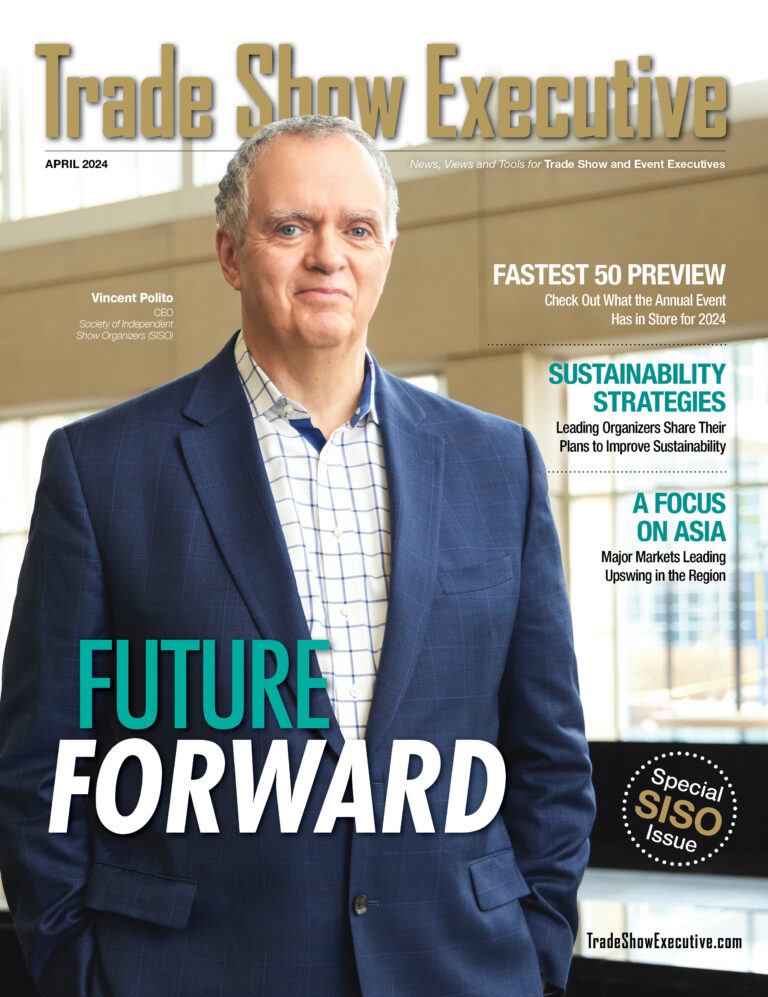Boston, MA – “The traditional model of operating a convention center at a loss with the premise of bringing outside dollars into a community is not sustainable,” said James Rooney, executive director, Massachusetts Convention Center Authority (MCCA). The model was created during the last half of the 20th century when trade shows expanded dramatically in the U.S. Cities of all sizes built first-class convention centers, and the inventory of meeting and exhibit space skyrocketed to meet the demand.
“Destinations bought into the idea that all the economic impact generated by events is reward enough for building, maintaining and upgrading facilities. It was acceptable for convention centers to operate as loss leaders,” said Rooney.
However, demand slowed noticeably after 9/11 and the recession, as growth dropped from the high double digits to single digits, or fell into the red. Domestically, new show launches were rare. Some shows in sectors under pressure fell by the wayside. As sales and other tax revenues lagged during the recession, the pressure from local government officials increased as cities sought ways to decrease expenses and increase revenue.
Today, lower sales and tax revenues continue to plague cities. To make up for the shortfalls, budgets for city services such as police, fire, education and road maintenance continue to be slashed. “Many destination leaders originally agreed to invest in building many of these centers as economic generators, not net revenue generators,” said Victoria Isley, executive vice president and chief operating officer, Destination Marketing Association International (DMAI). “Somehow that was forgotten between the economic downturn and a saturation of new buildings.”
At the same time, some associations have dealt with decreasing membership and lower attendance at their annual conventions. Trade show managers, facing cost pressures of their own, are driving hard bargains including demands for highly discounted rent or free rent – or they threaten to take their show elsewhere. “These groups are looking for more concessions in rent as they focus on increasing revenues,” said Rooney. “I don’t blame them. They are just trying to make the best business decisions for their organizations.”
“Meanwhile, government officials are questioning the convention center loss-leader model, and it’s getting harder and harder to justify the value,” said Rooney. “It’s getting tougher to sustain subsidies and maintain top-notch facilities with slower trade show growth rates. But it’s a buyer’s market, and demands for pricing and rent deals are more prevalent than ever.”
“The current model would be sustainable if show organizers were willing to pay what it’s worth,” said Greg Ortale, president and CEO, Greater Houston Convention and Visitors Bureau (GHCVB). “We look at the business in total – not at hotels and the building separately. If organizers try to wring every last dime out of the deal on both sides and there is no margin in either, then the deal doesn’t work. You have to ask yourself if it’s really good business for your community when you’ve invested billions in infrastructure. They are killing the golden goose.”
“Destinations are truly between a rock and a hard place,” said Vicki Hawarden, president and CEO, International Association of Venue Managers (IAVM). To address these conflicting dynamics, centers are looking to maximize their space and increase their occupancies. They are getting creative. Some might say too creative as the line between the private and public sectors continue to blur.
MCCA Takes Gutsy Move with New Business Model
In a groundbreaking move, MCCA has invested $500,000 in a strategy and product development team to explore new revenue streams for the three convention facilities that MCCA manages. “Nothing is off the table,” said Rooney. “That may mean creating, executing and partnering on trade shows, or that may mean developing new products and services to provide alternate revenue streams.”
In an exclusive interview with Trade Show Executive, Rooney offered an inside look at what leaders in Boston are doing to address this critical issue. In addition, TSE discussed new business models with other CVB and convention center executives, as well as industry association executives, to find out how this issue might impact show organizers in the years to come.
Read all about it in the MARCH issue of Trade Show Executive, available online …..











